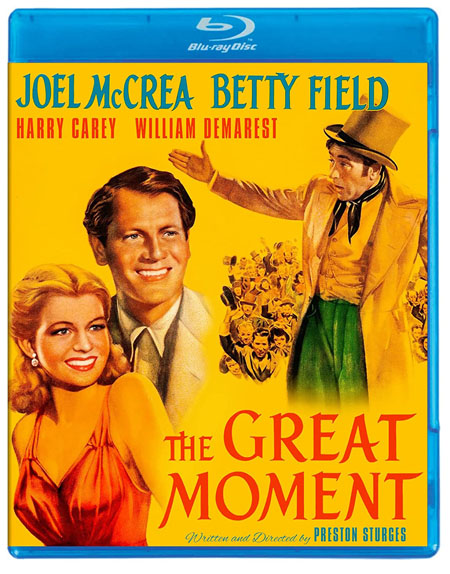
“ANESTHESIA
ON FILM”
By
Raymond Benson
Preston
Sturges’ filmmaking career in Hollywood between 1940-1944 is unparalleled. He
is often called the first “writer-director” who would helm his own screenplays
(actually this is untrue, since Charles Chaplin had been doing it since 1914,
and Orson Welles was also doing it in the early 40s), but there is no question
that Sturges became an auteur of sorts in those glorious five years. His flame
burned brightly for that short period, and then it sadly weakened and
eventually blew out.
One
of the reasons for the filmmaker’s demise was the unfortunate production of The
Great Moment, a biopic of a 19th Century dentist named Dr. William Thomas
Green Morton, who is (mostly) credited as discovering the use of ether as an
anesthetic for surgery.
Sturges,
who was known for his acerbic comedies like The Great McGinty (1940), The
Lady Eve (1941), and Sullivan’s Travels (1942), was apparently
obsessed with Morton’s story and had been working on a script as early as 1939
to be directed by Henry Hathaway. That project was shelved, and then Sturges
began his run of directing his own scripts in 1940. He resurrected the Morton biopic
on his own in 1942. It was based on the book Triumph Over Pain (1940) by
René Fülüp-Miller,
and that also became the title of Sturges’ script. The film was shot before the
making of The Miracle of Morgan’s Creek and Hail the Conquering Hero!
(both released in 1944). But Paramount, Sturges’ studio, didn’t like the Morton
biopic Sturges had made, and they took control away from the writer-director,
retitled it The Great Moment, and re-edited it. The film was finally
released two years after its production in 1944, after Miracle and Conquering
Hero. By then, Sturges had already left Paramount in disgust. The Great
Moment bombed at the box office and critics hated it. Sturges made a few
more films for other studios, but his career never regained the peak of his
earlier Paramount successes.
The
Great Moment exhibits
how Dr. Morton (Joel McCrea) discovers that ether allows him to successfully
pull a tooth from patient Eben Frost (Sturges’ stalwart character actor William
Demarest), so he develops a specially shaped bottle from which patients can
inhale the ether vapors. History has shown that Morton pulled pieces of his
“idea” from other doctors and his mentor, surgeon Professor Warren (Harry
Carey), and the story illustrates this. After Morton’s discovery, he endured
attacks to his claim, especially when he attempts to patent the process. The
medical profession is quick to condemn Morton for what they perceive as
“monetizing” the method by patenting it, even though Morton has no intention of
making a profit. He simply doesn’t want to reveal the ingredients of what’s in
the bottle. Morton and his wife, Elizabeth (Betty Field), withstand hardships
as Morton stubbornly pursues his claims in courts and even in a petition to the
president of the United States.
Doesn’t
sound like a comedy, does it? Well, it isn’t. There are humorous bits and
pieces in The Great Moment (mostly from Demarest), but the studio was
correct in determining that the film was not in keeping with the previous
“Preston Sturges Comedies.” Never mind that Sturges had likely made a good
biopic with a message about sacrifice. Paramount deleted scenes, rearranged the
narrative flow, and emphasized the few comic bits—and then they marketed the
film as if it were a Preston Sturges Comedy. It’s no wonder that
audiences were disappointed.
In
viewing The Great Moment today, one can see that it’s not a good film. It
really is “anesthesia on celluloid.” It is, as the late filmmaker Peter
Bogdanovich calls it in a supplement included on the new Kino Lorber disk, a
“mess.” The thing is, Sturges can’t be blamed for it. But for Preston Sturges
fans, it is an interesting document. We can see that there are indeed Sturges’
fingerprints all through the picture, and many of the Sturges “stock company”
are present (such as Franklin Pangborn, Porter Hall, and others). The irony and
bite that is pure Sturges is often there in the dialogue.
In
short, The Great Moment is a great failure, but one that illustrates how
Hollywood tended to squash talented auteurs who bucked the system in the 1940s
(like Sturges and Welles).
Kino
Lorber’s new Blu-ray edition looks pristine and sharp in its glorious black and
white. The disk includes the previously mentioned supplement, “Triumph Over
Pain: A Celebration of Preston Sturges,” which is a three-way Zoom call between
Tom Sturges (Preston’s son), Bogdanovich, and film historian Constantine Nasr. This
is a lot of fun and very informative (perhaps more entertaining than the
feature film!). Also of interest is a lengthy Introduction by Nasr, which goes
into the history of the problematic production. The theatrical trailers for
this and other Sturges’ releases round out the package.
The
Great Moment is
for fans of Preston Sturges, to be sure, but also for historians interested in documentation
of Hollywood’s miscalculations and bone-headed decisions when it came to
filmmakers who likely knew much more about what they were doing than the
studios behind them.
Click here to order from Amazon